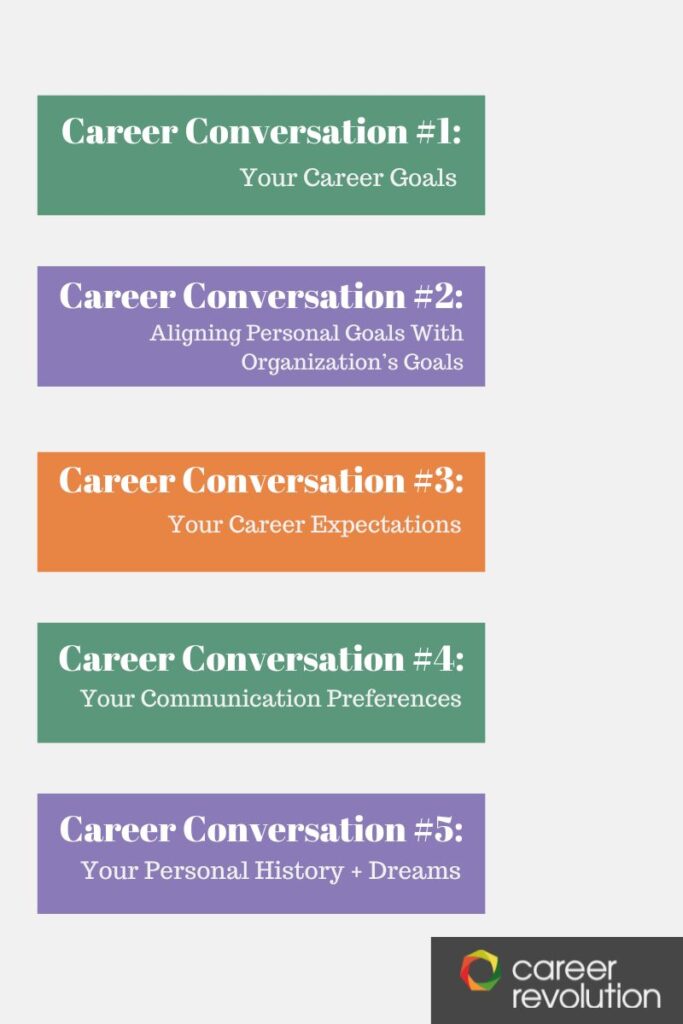In any career, it’s typical to talk about yourself (a lot) during the interview stage. These formative career conversations set the stage for the next few months or years of your career.
During this intensive informational exchange, you answer probing interview questions about your experience, skills, and five-year plans. If you’re asking the right questions, you’re also learning about your workplace, their goals, and what their huge goals are going forward.
Now, raise your hand if you’ve never had a career conversation outside of an interview or performance review. What’s up with that?
Career conversations, or stay conversations, facilitate open dialogue between managers and employees and between team members working toward organizational goals.
There’s a lot of unknown regarding careers and where they’re headed. When planned currently, career conversations benefit everyone in the room. It helps team members to truly understand everyone’s long-term ambitions, circumstances, and overall career goals. You can only achieve this by getting to know each member of your immediate team personally.
Having these conversations with your manager, mentor, or trusted colleagues can help you navigate your career more effectively and make informed decisions that align with your professional and personal aspirations.
Career Conversation 1: Your Career Path
Who Have This Career Conversation With: Yourself
The first career conversation you’ll tackle is with someone you’re very close to at work. To facilitate important carer conversations with managers, coworkers, and interdepartmental colleagues, you first need to have a heart-to-heart with yourself.
Ask yourself a few questions to define where you are headed and why. Some questions you can ask yourself include:
- What type of work energizes me?
- What values are most important to me?
- What career goals or milestones would I like to achieve within one year?
- What potential barriers might I encounter in working towards my goal?
- How do I think I’ll feel once I achieve these goals?
- Who could help me or advise me in working towards this goal?
Taking a few minutes to check in with yourself can be an extremely clarifying practice. Sometimes, feeling lost or unsatisfied in our careers is due to a simple disconnection between our work and our values.
Once you have an honest check-in with yourself, you’ll have clarity around preparing for your upcoming career conversations.
Career Conversation #2: Aligning Personal Goals with Your Organization’s Goals
Who Have This Career Conversation With: Your Manager, Your Colleagues
In this next career conversation, you’ll work to align your values and goals to your team’s and/or your entire organization’s.
Before reserving time on your boss’s calendar, complete some preparatory work. Arrive with a plan, and some pointed questions to ask.
Here is a three-step strategy to help facilitate a productive career conversation with your boss.
- Align Your Goals With the Organization’s + Your Team’s: Get the old Venn diagram to work by finding the overlap between your goals and the organization’s. Leave room for questions, too. Are these still the organization’s most important goals? Does it still make sense to work on goals you established when you started your position?
- Know Your Ask: If you’ve scheduled this career conversation with your boss, you may have ideas for skills improvement, classes, or special assignments you’d like to add to your plate. This might be the meeting where you request a professional development stipend or on-the-job training.
- Open Yourself to Change: Because we tend to have career conversations as a reaction to a problem, you might find that your values aren’t aligning any longer. If you find that this is the case, it might be time for a pivot. Your pivot may or may not include your organization. That part is up to you.
Career Conversation #3: Your Career Expectations
Who Have This Career Conversation With: Manager
In our next career conversation, we will dive into communication preferences. Before that, let’s talk about expectations. This is one of those career conversations you can have at a macro- and micro-level.
Macro Expectations at Work
- What do we know about the history of my role? What did other employees manage or achieve optimally in this role?
- What will a successful first year look like for someone in this role?
- What are the three main priorities for this role?
Micro Expectations at Work
- What is the goal of this specific project?
- What impact is my contribution expected to make?
- How will I know I was successful in this meeting/on this phone call/in completing this project?
Set your career expectations early if possible. Like many of these career conversations, use this talk to open yourself up to future conversations about expectations—especially when it comes to adjusting or modifying them.
Career Conversation #4: Your Communication Preferences
Who Have This Career Conversation With: Manager, Entire Team
One of the most important career conversations rarely happens. Communication is the cornerstone of any strong workplace. Unsurprisingly, the weakest workplaces usually exhibit poor communication strategies or none at all.
Anyone who has worked remotely knows the importance of different communication channels, using clear language, and keeping an open line for questions, input, and feedback. And don’t forget your boundaries!
Let’s explore how we can communicate our preferences.
Identify Your Preferences: Determine your preferred communication methods (e.g., email, instant messaging, face-to-face, video calls) and styles (e.g., concise, detailed, formal, informal).
Understand Situational Preferences: Consider how your preferences might change depending on the situation, such as for urgent matters versus routine updates.
Encourage Others to Share Their Preferences: Sharing your communication preferences might start a lightbulb moment for your colleagues. When sharing your communication preferences, encourage your colleagues to share theirs. This is a great way to eliminate (or at least drastically reduce) communication problems.
Career Conversation #5: Your Personal History + Your Dreams
Who Have This Career Conversation With: Your Colleagues, Friends, Partner, Manager, Self
While this conversation is similar to discussing your goals and personal values, it is slightly different. When thinking about these important career conversations, I found this article by writer Brandi Neal on Radical Candor. In it, the writer explores the more personal side of career conversations.
Instead of speaking about workplace communication, goals, or professional development, these conversations address personal history.
Specifically, the writer shares a conversation structure created by Russ Laraway, VP of people operations at Qualtrics that dives into your past, present, and future. The steps are as follows:
1. Start With the Past: Your Life Story
What’s your story? Aside from the professional accolades listed on your resume and LinkedIn, who are you? How does that inform where you are? What are some huge takeaways you’ve learned?
2. Talk About Your Future: Your Dreams
Close your eyes. Now, envision where you’d like to see yourself at the pinnacle of your career. What do you want to be when you “grow up” in your career? Everyone has dreams, and we should! This exercise helps you to vocalize them, and, by extension, make them a little more tangible.
Envision your dreams. Write them down. Share them! Most importantly, be flexible to the very real possibility that your dreams will change as you progress through your life and career.
3. Plan for Your Present: Your Career Action Plan
Now that you’ve explored your past and dreamed about the future, make an actionable plan to put into motion…right now! This might be an ongoing exploration you have with yourself for a while before sharing it with your manager.
When you feel ready, conversations like these are best to have during a weekly 1:1 or a review. If your organization doesn’t provide either of those recurring meetings, get it on the calendar!
In Conclusion
The best aspect of many of these conversations is that they can tend to be quite contagious. While, as a more junior employee, it might feel audacious to communicate your preferences to your boss, these upfront conversations often become part of the organizational blueprint.
Why wouldn’t we all want to explore our goals and aspirations with the people working alongside us toward the same outcome?
Now, get that time on your calendar!








